Typical college courses end in a flurry of projects, guest speakers, presentations and final papers as students and professors gather all they need to wind up a semester.
Few get the “Cold Hard Truth” of a course subject’s life straight from one who shared it. Then again, few experiential learning courses are a learning experience like the MTSU Commercial Songwriting Program class on “The Life and Music of George Jones.”
MTSU recording industry students got “The Grand Tour” of the late country icon’s Nashville museum, plus a surprise campus visit from the woman of whom he lovingly sang “She’s My Rock,” Nancy Jones, during two special opportunities this fall.
 Commercial Songwriting Program director Odie Blackmon arranged the students’ excursion to the museum on Nashville’s Second Avenue as a treat, inviting memorabilia expert Warwick Stone to join the adventure and offer his expertise and commentary during their tour.
Commercial Songwriting Program director Odie Blackmon arranged the students’ excursion to the museum on Nashville’s Second Avenue as a treat, inviting memorabilia expert Warwick Stone to join the adventure and offer his expertise and commentary during their tour.
Then Blackmon learned that Nancy Jones, who established a scholarship at MTSU for Department of Recording Industry majors shortly after her husband’s 2013 death, wanted to stop by and talk with the students during Blackmon’s class.
The Shreveport, Louisiana, native said it was her first public sit-down visit with a group wanting to learn about the man first known as “Possum” and later, thanks to his substance abuse problems, as “No-Show Jones.”
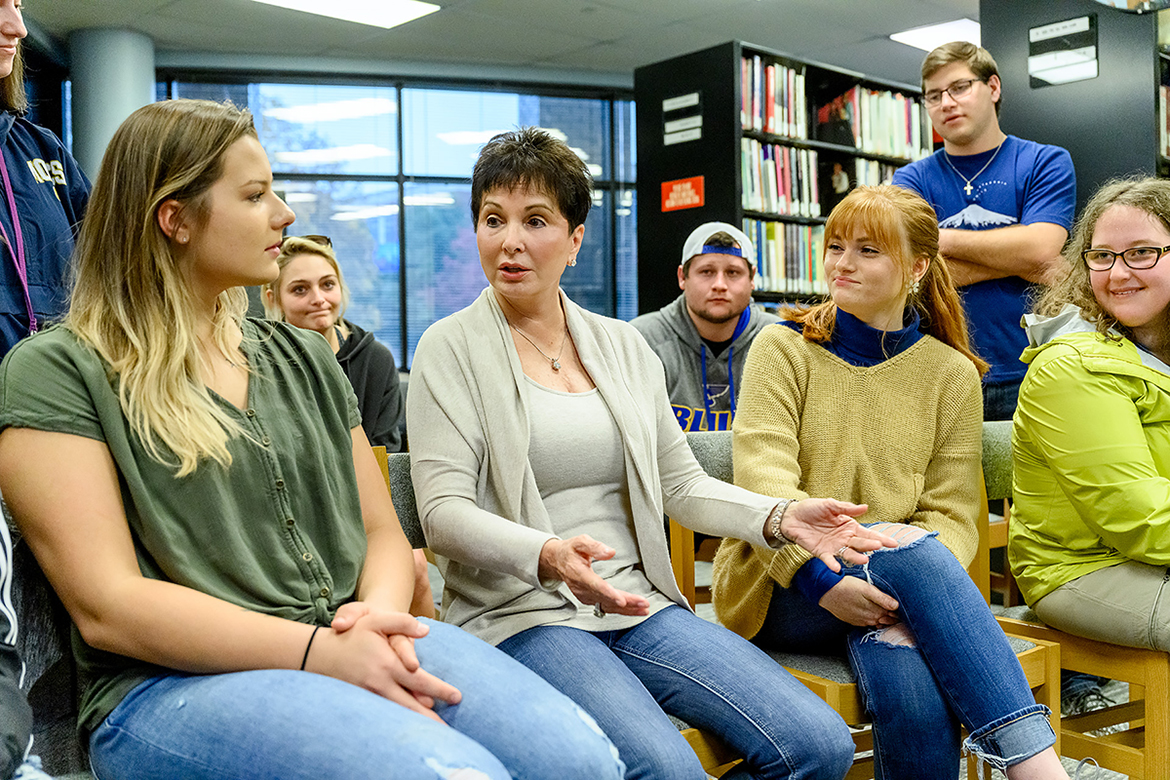
Nancy Jones, center, wife of the late country music icon George Jones, answers a question from MTSU junior Megan Johnson, left, while junior Georgia Brown, center right, and fellow recording industry students listen in the Center for Popular Music during a special campus visit. Jones, who established a scholarship at MTSU for Department of Recording Industry majors shortly after her husband’s 2013 death, discussed her husband’s music and their 30-plus years of adventures in the entertainment industry. (MTSU photo by J. Intintoli)
She kept the audience spellbound with stories of her adventures, by turns hilarious and poignant, with Jones, telling of their first meeting in 1981, their spur-of-the-moment 1983 wedding with only two family witnesses and a preacher, their years of traveling and struggling together, and how she finally convinced the bashful legend to open a museum for the career memorabilia he preferred to give away.
“People know the stories of George Jones, but you REALLY don’t know the stories of George Jones,” she said with a laugh. “Odie loved George so much and he did a lot of research (for this class) to find out that this was such a kind, good-hearted man, but demons will get inside you, and it’s hard to get ’em out once they take control.
“That’s why I wanted to do the scholarship, too, so people could understand that he was a great guy, not just what you’d hear: ‘Oh, he did this, he did that.’ Some of it’s true, but a lot of it’s not. I wanted y’all to have the opportunity to learn about him and how great country music is, because that was his heart.”
You can see a video recap of Jones’ visit above.
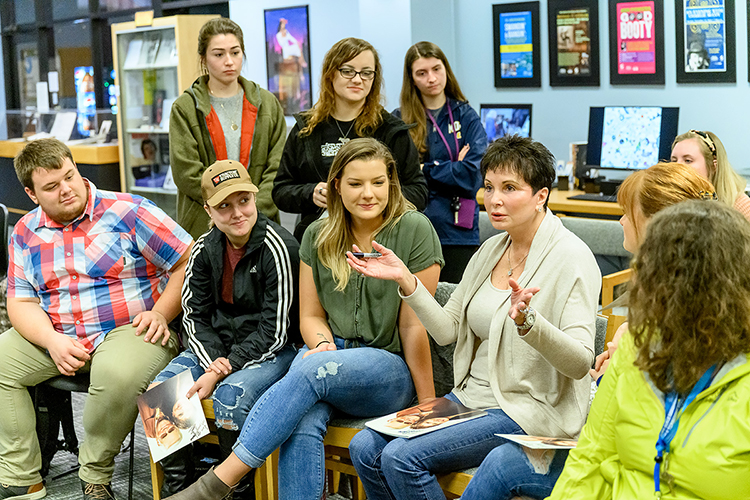
Nancy Jones, center, wife of the late country music icon George Jones, is surrounded by MTSU recording industry students while she makes a point about her husband’s music and their 30-plus years of adventures in the entertainment industry during a special campus visit in the Center for Popular Music. Jones, who established a scholarship at MTSU for Department of Recording Industry majors shortly after her husband’s 2013 death, also has been a strong supporter of the university’s experiential learning class, “The Life and Music of George Jones,” taught by Commercial Songwriting Program director Odie Blackmon. (MTSU photo by J. Intintoli)
The students’ visit to the Jones museum gave them another insiders’ look at a career that spanned six decades and an unprecedented collection of top 10 hits, including “He Stopped Loving Her Today,” Jones’ 1980 hit dubbed the “greatest country record of all time.” They also saw some of the items Nancy Jones mentioned and they’d read about while studying his autobiography, “I Lived to Tell It All,” for the class.
The exhibits include everything from Jones’ show-stopping Nudie suits, gold records, many awards and precious family photos to a piece of the state Route 96 bridge near their home that helped, in a near-fatal 1999 traffic accident, to finally end the decades of drinking and drugging he’d done to numb his horrible stage fright.
“I think my favorite part of the museum … well, one would be Bandit, the dog we had. She traveled on the bus with us; she slept on the nightstand! … She was so close to George,” Jones said in response to a student’s question, laughingly recalling a pre-opening visit in 2015.
“Well, she lays down flat, under those domes (at the museum), and listened to his music. She was blind, she couldn’t hear, and she acted like she was a year old again! All of a sudden, something like ‘White Lightning’ came on … and all the way around that place she would go. Then she’d stop and say ‘WHEW.’ George used to think that was the funniest dog ever, and she was.”
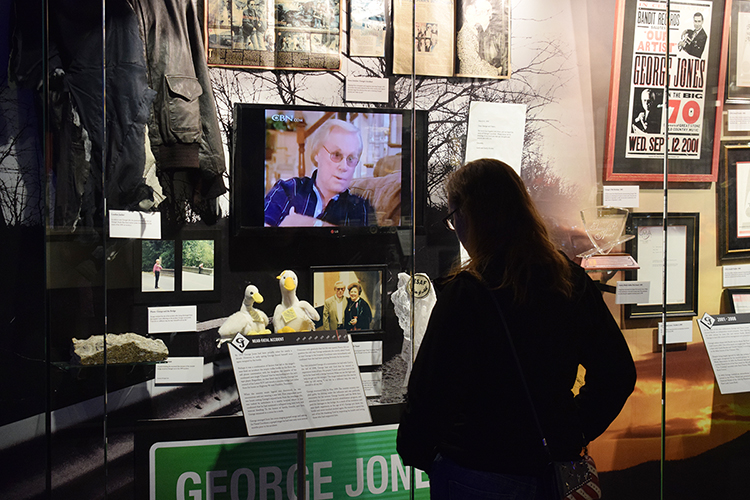
An MTSU recording industry student closely inspects memorabilia during a special tour of the George Jones Museum in downtown Nashville by the university’s experiential learning class, “The Life and Music of George Jones,” taught by Commercial Songwriting Program director Odie Blackmon. Included in this case is a piece of the bridge Jones crashed his SUV into in 1999, a near-fatal wreck he and his wife, Nancy, credited with saving his life. Nancy Jones, who supplied the museum items with her husband’s guidance before his 2013 death, visited with the Jones class the day before the tour to discuss the couple’s adventures. (Photo courtesy of Odie Blackmon)
Blackmon, who’s now in his sixth year of teaching the Jones course, offered his students a few unexpected tidbits about the man NPR called “the voice of heartbreak,” too.
“The cool thing about George that people may not know is that before Dolly (Parton‘s Dollywood), before Conway (Twitty‘s Twitty City), he was probably the first person that wanted to have a country music theme park, and he had three or four of them,” Blackmon said, holding up a “Jones Country” theme park brochure from the 1980s Woodville, Texas, venue.
“Here’s the king of country music, and he’s out there setting up bonfires and burning brush and pushing a tree over and all that.”
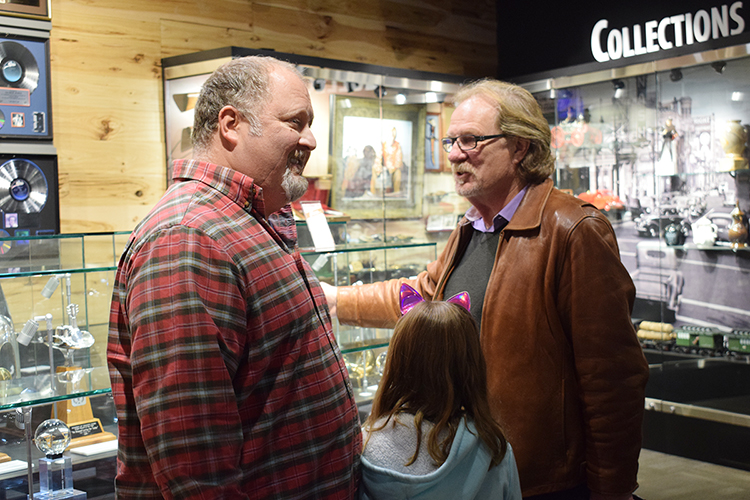
MTSU Commercial Songwriting Program director Odie Blackmon, left, and memorabilia expert Warwick Stone pause in front of a display of gold and platinum records and multiple industry awards at the George Jones Museum in downtown Nashville. Blackmon toured the site with students in his experiential learning class, “The Life and Music of George Jones,” after learning more about the entertainer during a special campus visit from his wife, Nancy Jones, this fall. (Photo courtesy of Odie Blackmon)
Preserving her husband’s contributions to American music has been Nancy Jones’ focus for many years. Part of that effort includes an upcoming film, planned for a November 2020 release, that she said will “tell the truth” about George Jones’ most challenging years and his fight to continue sharing the music he loved with those who loved it — and him.
“He said he would die being country, and loving country music, because it tells a story. … He told the hardship and the love in country music and how it relates to everyone,” she said.
“When he was dying, I said, ‘I’m gonna carry your legacy on. George, you’re an icon.’ And he said, ‘Aw, honey, don’t say that. I can’t even spell that word.’
“He was just a humble, good man.”
More information about MTSU’s Commercial Songwriting Program, based in the Department of Recording Industry in the College of Media and Entertainment, is available at www.mtsu.edu/programs/commercial-songwriting.
— Gina E. Fann (gina.fann@mtsu.edu)
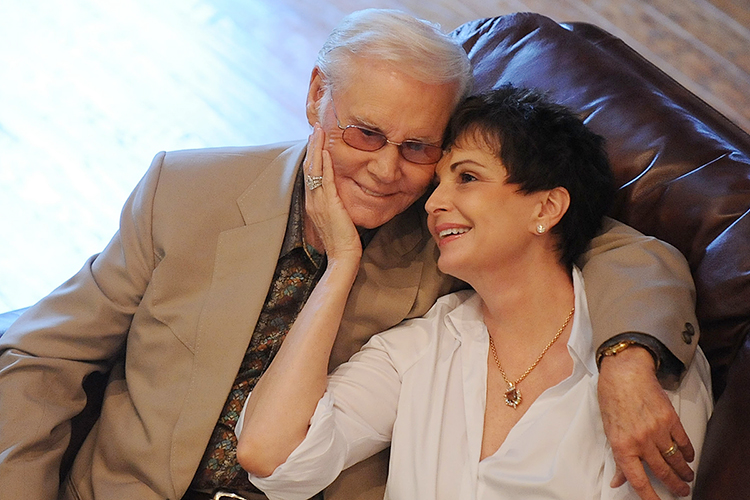
Country music legend George Jones and his wife, Nancy, are shown in this 2010 publicity photo. Nancy Jones, who established a scholarship at MTSU for Department of Recording Industry majors shortly after her husband’s 2013 death, discussed his music and their 30-plus years of adventures in the entertainment industry during a recent campus visit prompted by the sixth year of the university’s experiential learning class, “The Life and Music of George Jones.” (Photo courtesy of Rick Diamond/Getty Images)
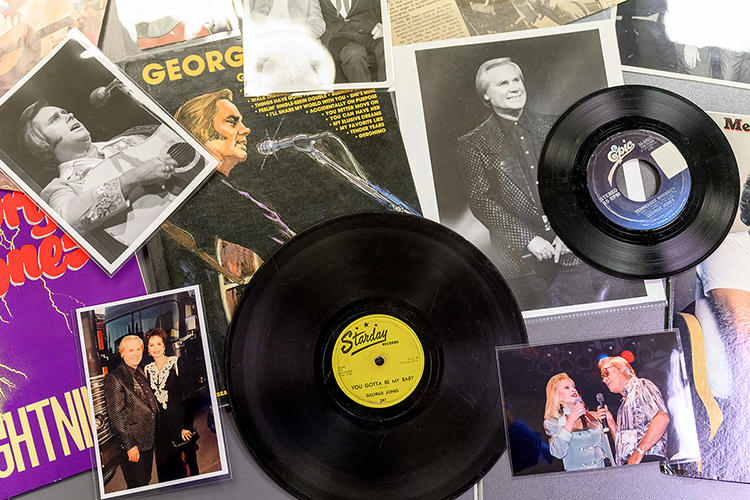
A selection of country music icon George Jones’ career memorabilia is on display at MTSU’s Center for Popular Music during a special campus visit this fall from the late singer’s wife, Nancy Jones. Jones, who established a scholarship at MTSU for Department of Recording Industry majors shortly after her husband’s 2013 death, discussed hiss music and their 30-plus years of adventures in the entertainment industry during her visit, prompted by the sixth year of the university’s experiential learning class, “The Life and Music of George Jones.” (MTSU photo by J. Intintoli)

COMMENTS ARE OFF THIS POST